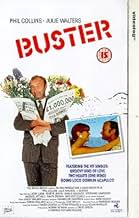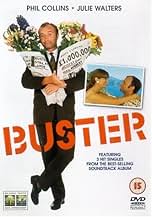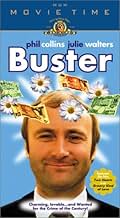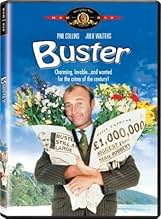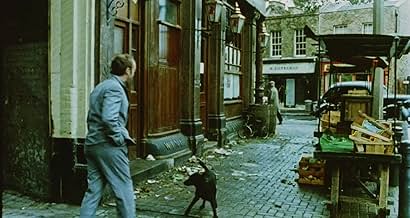VALUTAZIONE IMDb
5,9/10
4571
LA TUA VALUTAZIONE
Ronald Christopher "Buster" Edwards, uno dei ladri coinvolti nella "Grande rapina al treno" del 1963.Ronald Christopher "Buster" Edwards, uno dei ladri coinvolti nella "Grande rapina al treno" del 1963.Ronald Christopher "Buster" Edwards, uno dei ladri coinvolti nella "Grande rapina al treno" del 1963.
- Regia
- Sceneggiatura
- Star
- Candidato a 1 Oscar
- 4 vittorie e 1 candidatura in totale
Recensioni in evidenza
With the title "Buster" given to this film starring Phil Collins in the title role, this movie directed by David Green is all about the 1963 Great Train Robbery when a gang of robbers carried out the biggest robbery in criminal history for £2.5 million was big money for 1963 prices. Worst, the train driver Jack Mills sustained head injuries during the attack and later died from leukaemia. For a reason why Phil Collins made this film was that he maintained close contact with one of the robbers Ronald "Buster" Edwards.
The 1960s scenes are well put together on film here but it's very underrated. Larry Lamb looks almost strikingly like one of the gang leaders Bruce Reynolds. Well, the film has been criticised for glorifying the robbery. There is nothing glamorous about the robbery as it was a vicious crime. Phil Collins might steal your heart but not on this film while some of the robbers have returned to their criminal haunts and it now seems to be that many years after the robbery, most of the gang members have long since disappeared just like most of the money and in 1994, Buster Edwards struck down by depression,hanged himself in a disused garage near London's Waterloo Station where he traded as a flower seller.
Buster has been knocked by critics over the years for being too sympathetic to the real life criminals it portrays, for the love story between Buster Edwards & June and for treating a serious crime as a caper full of cheeky cockneys, chirpy Phil Collin's songs and a comedic light touch afforded by director David Green. This is a shame because as British gangster films go this is very entertaining and well acted with Collins surprisingly engaging in the lead opposite the ever reliable Julie Waters, and with a fine ensemble cast of Larry Lamb, Anthony Quayle, Ralph Brown, Martin Jarvis, Christopher Ellison and Sheila Hancock.
With the Government at the time reeling from the Profumo scandal in the 1960's the Great Train Robbery couldn't have come at a worse time, causing the general public to get on the side of the train robbers who were seen as working class heroes. This is what David Green set out to show with his film by making the characters and situation appealing and getting the audience on their side. If it was a fictional crime caper like The Italian Job that wouldn't be an issue but as this is based on real life events and a victim got killed during the robbery the filmmakers are on shaky ground resulting in this artistic decision backfiring and being lambasted by critics for it. The showing of the film at a Royal Premiere in 1988 was also cancelled due to accusations of it glorifying crime.
While the critics may have had a point I usually put that to one side and enjoy it for what it is, whether it is factually accurate or not, it's still one of my favourite British movies made in the 1980's. Sadly the original negative has been lost so what we are left with is a low grade copy that has since been colour graded several shades of green throughout for reasons only known to the colourist.
Phil Collins well received pop songs especially written for the soundtrack helped the film's general appeal but it is Anne Dudley's score that really drives the film along, especially during the robbery scene. While Phil is no Bob Hoskins, David Green's original choice for Buster, he more than holds his own and I find it surprising he didn't go on to do more high profile acting roles after this one.
With the Government at the time reeling from the Profumo scandal in the 1960's the Great Train Robbery couldn't have come at a worse time, causing the general public to get on the side of the train robbers who were seen as working class heroes. This is what David Green set out to show with his film by making the characters and situation appealing and getting the audience on their side. If it was a fictional crime caper like The Italian Job that wouldn't be an issue but as this is based on real life events and a victim got killed during the robbery the filmmakers are on shaky ground resulting in this artistic decision backfiring and being lambasted by critics for it. The showing of the film at a Royal Premiere in 1988 was also cancelled due to accusations of it glorifying crime.
While the critics may have had a point I usually put that to one side and enjoy it for what it is, whether it is factually accurate or not, it's still one of my favourite British movies made in the 1980's. Sadly the original negative has been lost so what we are left with is a low grade copy that has since been colour graded several shades of green throughout for reasons only known to the colourist.
Phil Collins well received pop songs especially written for the soundtrack helped the film's general appeal but it is Anne Dudley's score that really drives the film along, especially during the robbery scene. While Phil is no Bob Hoskins, David Green's original choice for Buster, he more than holds his own and I find it surprising he didn't go on to do more high profile acting roles after this one.
I remember watching Buster one afternoon at High School during the fag end of term time before summer holidays. The opening scene with the dust bin going through the window raise quite a cheer!
Buster is a typical sort of British crime film that is not actually as bad as its detractors will insist, but neither as good as its champions try and tell you. It supposedly recounts the infamous Great Train Robbery of 1963 from the perspective of Ronald 'Buster' Edwards - probably the most well known participants, although not the most important. Just a pity then the planning and execution of 'the job' only takes up about twenty minutes.
The remaining running time, before and after the Robbery, including a fairly lackadaisical police pursuit, and the extended holiday in Mexico, is a dull kitchen sink drama between Phil Collins and his beloved Julie Walters; she's the long suffering wife; he's the lovelable rogue, heart of gold, good family man, lives by 'respect', etc.
In other words, Buster sets the template for any or all of the cheeky chappy Mockney geezers in the endless cycle of runabouts and capers we would see a decade later.
Given the level of talent involved the acting is generally quite good - but it could have been better; Walters's incessant whinging soon grates; Collins isn't bad in the lead role, but he doesn't make much of an impact either. The soundtrack is OK, but overall I'd say Buster was a bit of a chore to sit through.
That the film downplays the violence of the robbery, the critical injuries sustained by train driver Jack Mills, the threats to Post Office staff, and the unsavoury background of the principals - most were professional criminals who did not baulk at using force, and were who were aware of the risks of who they were ripping off - caused great contraversy at the time. Sure, one or two minor members may have been unjustly sentenced, but I'd question how much public sympathy there was for these 'Robin Hoods' when the extent of Mr Mills's ordeal became known.
Try Bank Heist, Thief, The League of Gentlemen or The First Great Train Robbery if you want to see a decent heist movie with a lot more tension and comedy. Compared to these gems, Buster is a bit of a letdown.
Buster is a typical sort of British crime film that is not actually as bad as its detractors will insist, but neither as good as its champions try and tell you. It supposedly recounts the infamous Great Train Robbery of 1963 from the perspective of Ronald 'Buster' Edwards - probably the most well known participants, although not the most important. Just a pity then the planning and execution of 'the job' only takes up about twenty minutes.
The remaining running time, before and after the Robbery, including a fairly lackadaisical police pursuit, and the extended holiday in Mexico, is a dull kitchen sink drama between Phil Collins and his beloved Julie Walters; she's the long suffering wife; he's the lovelable rogue, heart of gold, good family man, lives by 'respect', etc.
In other words, Buster sets the template for any or all of the cheeky chappy Mockney geezers in the endless cycle of runabouts and capers we would see a decade later.
Given the level of talent involved the acting is generally quite good - but it could have been better; Walters's incessant whinging soon grates; Collins isn't bad in the lead role, but he doesn't make much of an impact either. The soundtrack is OK, but overall I'd say Buster was a bit of a chore to sit through.
That the film downplays the violence of the robbery, the critical injuries sustained by train driver Jack Mills, the threats to Post Office staff, and the unsavoury background of the principals - most were professional criminals who did not baulk at using force, and were who were aware of the risks of who they were ripping off - caused great contraversy at the time. Sure, one or two minor members may have been unjustly sentenced, but I'd question how much public sympathy there was for these 'Robin Hoods' when the extent of Mr Mills's ordeal became known.
Try Bank Heist, Thief, The League of Gentlemen or The First Great Train Robbery if you want to see a decent heist movie with a lot more tension and comedy. Compared to these gems, Buster is a bit of a letdown.
Buster (Phil Collins) is a petty thief with some skill. If he wants a new suit, he just breaks a store window and makes off with a mannequin. If the baby needs supplies, Buster sneaks into the chemist's at night and picks out what is needed. His wife June is getting a bit tired of this and would love to have a place of their own, not a rental. Therefore, Buster arranges a major train robbery (THE Great Train Robbery in the early sixties). The plot is almost successful but Buster does not remain anonymous and is a hunted man, post robbery. Will he ever see his family again? This is a very likable movie about an unlikely charmer. Buster does not want an honest job to support his family but one just can not help liking the guy. Collins is quite good as this amusing thief. Julie Walters, as his wife, is also sweet and attractive. The plot is amazing when one realizes these events actually took place. Part love story, part cat and mouse game, this film is a fun view. Anyone who sits down to Buster will be laughing in short order, leaving the sometimes somber world behind.
I was 8 when Buster first came out and I think I seen it around about that time. Hilarious how it can be classed as a 15 given some of the stuff nowadays that passes for PG. The movie itself is fun. The characters are believable and as I say in the title there is a real honesty and relatability to the script as it reflects British working class life pretty accurately. It's by no means high brow filmmaking and relys on the 2 main actors ability to connect with the audience by portraying their relationship as very believable. Walters and indeed Collins are adept at portraying June and Buster. Overall a good feel good movie. Should be 6.5. Wish IMDB allowed half marks.
Lo sapevi?
- QuizThe movie was conceived with Bob Hoskins as Ronald Christopher "Buster" Edwards, but the filmmakers decided he'd played that sort of part in Il giorno del venerdì santo (1980) and Mona Lisa (1986). Phil Collins was cast instead after director David Green saw his performance in Miami Vice (1984). David Jason was also considered for the role of Buster at one point.
- BlooperIn the opening scenes, when Buster walks off wearing a new suit he has just stolen, a Vespa P range motor scooter is visible. That model was introduced in 1977.
- Citazioni
June Edwards: [when discussing buying a house worth £3,000] You could get a mortgage like other people!
Buster Edwards: Do what?
June Edwards: Borrow it from a bank.
Buster Edwards: Well, I *do* borrow from banks, that is my job.
June Edwards: I mean with their permission
Buster Edwards: I thought you needed a reference to do that,
- Curiosità sui creditiBuster Edwards never got the deal he hoped for. On the 9th December 1966 he was sentenced to 15 years imprisonment for conspiring to rob Her Majesty's Royal Mail Train.
- Versioni alternativeThe initial U.S. release of this film had its running time cut from 102 minutes to 94 minutes by its U.S. distributor, Hemdale Films. The subsequent video release by HBO Home Video was based on this edited version, however, a more recent release by MGM Home Video includes the complete film uncut.
- ConnessioniFeatured in Parkinson One to One: Episodio #2.7 (1988)
- Colonne sonoreTwo Hearts (One Mind)
Performed by Phil Collins
Written by Lamont Dozier / Phil Collins
Courtesy of Hit & Run Music Ltd./Buster Films Ltd.
Published by Philip Collins Ltd./Hit & Run Music (Publishing) Ltd./Warner Brothers Music
I più visti
Accedi per valutare e creare un elenco di titoli salvati per ottenere consigli personalizzati
- How long is Buster?Powered by Alexa
Dettagli
Botteghino
- Lordo Stati Uniti e Canada
- 540.000 USD
- Fine settimana di apertura Stati Uniti e Canada
- 265.038 USD
- 27 nov 1988
- Lordo in tutto il mondo
- 540.000 USD
- Tempo di esecuzione1 ora 42 minuti
- Colore
- Mix di suoni
- Proporzioni
- 1.85 : 1
Contribuisci a questa pagina
Suggerisci una modifica o aggiungi i contenuti mancanti



